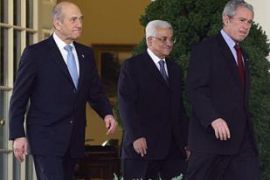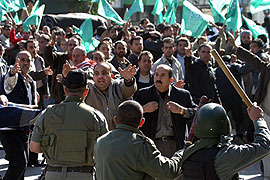Bush pledges support for peace push
US president says he will use US power to help Middle East peace.

“We will use our power to help you as you come up with the necessary decisions to lay out a Palestinian state that will live side by side in peace with Israel.”
Bush met the two leaders separately, then together, before appearing before the media.
|
Your Views |
|
“You need a state before you can have a chance at democracy and permanent peace”. |
On Wednesday, she announced the appointment of James Jones, a marine general and former Nato commander, to the post of US liaison between Israel and the Palestinians.
The Bush administration pronounced itself pleased with the outcome of the conference that drew 44 nations, including Saudi Arabia and Syria, considered vital to any peace agreement.
“I think in the region you are seeing that the Arab states that have not been as active in the peace process in the past were there in the room, including Saudi Arabia,” she said.
He ruled out conceding the right of return of Palestinian refugees to Israel, saying it would swamp the Jewish state with Arabs.
 |
| Protests against Annapolis erupted again on Wednesday in the city of Hebron [AFP] |
“No one would seriously think of establishing two states, one Palestinian and another in which Palestinians would become the majority after the return of Palestinians to Israel,” he said.
Refugees and their descendants displaced in the founding of Israel in 1948 are estimated to number more than four million and the Palestinians have made their rights a central demand in talks with Israel on a peace deal.
Olmert also said the end of 2008 deadline might slip, “but you have to start somewhere. And we are committed, absolutely, to help start it”.
Scepticism
Abbas, speaking after the White House send-off, said Bush seemed determined to reach a peace treaty during his term.
| Hamas |
|
Hamas was not invited to Annapolis and has said repeatedly that it would not be bound by any deals that Abbas strikes.
Stephen Hadley, Bush’s national security adviser, emphasised US efforts to isolate Hamas on Wednesday.
“We are looking for a two-state solution, not a three-state solution.”
If a Palestinian state is achieved, “the Palestinians in Gaza are going to have to make a choice,” he said.
On Wednesday, Israeli air and sea attacks targeting Hamas killed four people and wounded eight.
Iran was also not invited to Annapolis, and some have suggested a second agenda to the talks: rallying Arab support against Iran. |
“We found him zealous in that direction,” he said.
He also said that while the agreement to resume talks was only the beginning of the process, the Palestinians “achieved what we came here for”.
“We came here to start negotiations, and we got that.”
But he and Olmert were to return home to much scepticism for “making peace for the cameras” as one headline in the Israeli tabloid Maariv put it.
Dana Perino, the White House press secretary, said Bush had asked Abbas for the region’s reaction but neither Iran, which called the conference as “stillborn” nor demonstrations against the talks by tens of thousands of Hamas supporters in Gaza was mentioned.
The Annapolis plan did receive cautious support from the 22-member Arab League, however.
Amr Mussa, secretary-general of the league, cited “misgivings” but said: “We want to give this opportunity a chance. During the next two months we will test the Israelis’ intentions to see if they are serious, or if this is just another game.”
